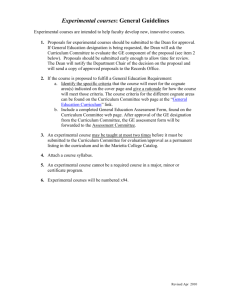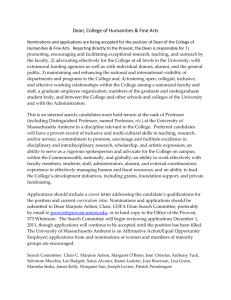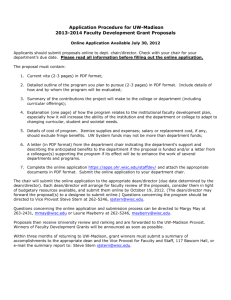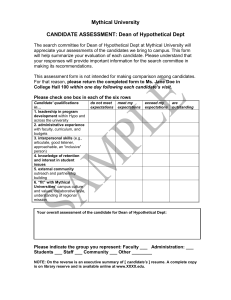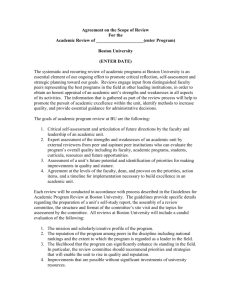Faculty Search Guidelines
advertisement
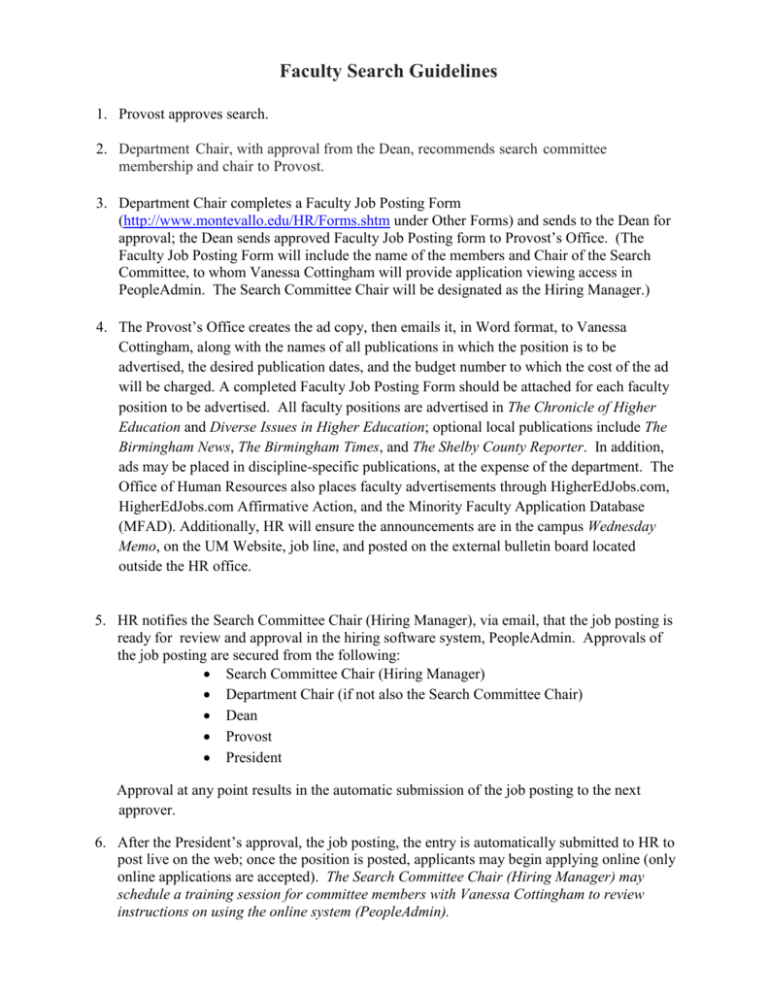
Faculty Search Guidelines 1. Provost approves search. 2. Department Chair, with approval from the Dean, recommends search committee membership and chair to Provost. 3. Department Chair completes a Faculty Job Posting Form (http://www.montevallo.edu/HR/Forms.shtm under Other Forms) and sends to the Dean for approval; the Dean sends approved Faculty Job Posting form to Provost’s Office. (The Faculty Job Posting Form will include the name of the members and Chair of the Search Committee, to whom Vanessa Cottingham will provide application viewing access in PeopleAdmin. The Search Committee Chair will be designated as the Hiring Manager.) 4. The Provost’s Office creates the ad copy, then emails it, in Word format, to Vanessa Cottingham, along with the names of all publications in which the position is to be advertised, the desired publication dates, and the budget number to which the cost of the ad will be charged. A completed Faculty Job Posting Form should be attached for each faculty position to be advertised. All faculty positions are advertised in The Chronicle of Higher Education and Diverse Issues in Higher Education; optional local publications include The Birmingham News, The Birmingham Times, and The Shelby County Reporter. In addition, ads may be placed in discipline-specific publications, at the expense of the department. The Office of Human Resources also places faculty advertisements through HigherEdJobs.com, HigherEdJobs.com Affirmative Action, and the Minority Faculty Application Database (MFAD). Additionally, HR will ensure the announcements are in the campus Wednesday Memo, on the UM Website, job line, and posted on the external bulletin board located outside the HR office. 5. HR notifies the Search Committee Chair (Hiring Manager), via email, that the job posting is ready for review and approval in the hiring software system, PeopleAdmin. Approvals of the job posting are secured from the following: Search Committee Chair (Hiring Manager) Department Chair (if not also the Search Committee Chair) Dean Provost President Approval at any point results in the automatic submission of the job posting to the next approver. 6. After the President’s approval, the job posting, the entry is automatically submitted to HR to post live on the web; once the position is posted, applicants may begin applying online (only online applications are accepted). The Search Committee Chair (Hiring Manager) may schedule a training session for committee members with Vanessa Cottingham to review instructions on using the online system (PeopleAdmin). 7. The Search Committee meets with the Director of Human Resources to review search procedures and EEO guidelines. 8. The Search Committee reviews applications and determines which applicants have submitted complete applications and meet the published criteria for the position. 9. The Search Committee conducts telephone or video interviews with semi-finalists (see Interview Guidelines—Conducting Telephone Interviews with Applicants—below). 10. The Search Committee checks references for semi-finalists (see Interview Guidelines— Conducting Interviews with References—below). 11. The Search Committee identifies finalists. The Search Committee Chair (Hiring Manager) updates the PeopleAdmin system to indicate the names of the candidates selected for interviews and the reasons for selection/non selection of ALL candidates. The results are then forwarded (via PeopleAdmin) to the HR Director/EEO Officer for certification. It is important that the entire pool of applicants be reviewed and certified by the Director of Human Resources/EEO Officer for compliance prior to scheduling campus interviews. 12. Following certification of the pool by the Director of Human Resources/EEO Officer, the Search Committee Chair (Hiring Manager) emails a brief report to the Provost that includes the total number of applicants, the number of applicants who meet the minimum qualifications, confirmation that the pool has been certified by the EEO Officer, a synopsis of the qualifications of the top three candidates, confirmation that references have been checked on the top three, and a request to bring a maximum of three candidates to campus. 13. The Provost approves candidates for on-campus interviews. 14. The Search Committee Chair contacts the finalists to notify them of the proposed salary and invite them to campus if they remain interested in the position. Only in exceptional circumstances will a department be allowed more than three campus interviews for a position and, even then, only after it has been determined that the three originally invited to campus have been eliminated from further consideration. 15. The Search Committee conducts campus interviews and solicits comments from all faculty, staff, and students who participate in the process (see Guidelines for Campus Visits, below). 16. The Search Committee obtains permission from the top candidate(s) to contact unlisted references and checks at least one unlisted reference. Unless an exception is approved by the Dean and Provost, the immediate supervisor must be among the listed or unlisted references checked before an offer can be extended. 17. The Search Committee Chair obtains a rank-ordered list of finalists with brief notes of the strengths and weaknesses of each and sends to the Provost the endorsed list of finalists. 18. The Provost notifies the Search Committee Chair and Department Chair of approval to make a tentative offer. The Department Chair extends the offer and informs the applicant that the offer is contingent upon the successful completion of a background check. 19. Upon the candidate’s verbal acceptance of the offer, the Search Committee Chair submits (via PeopleAdmin) the name of the selected candidate to HR for a background check (reason for selection must be identified). 20. HR conducts the background check and notifies the Search Committee Chair of the results. 21. If the background check reveals no problems, the hiring department completes a Personnel Action Form (PAF), which is submitted to the Dean for approval. 22. The Dean approves the PAF and submits it to the Provost’s Office, initiating the preparation of an appointment letter. Two copies of the appointment letter are sent by the Provost’s Office to the selected candidate including instructions to sign and return one copy of the letter to the Provost’s Office. 23. Following the receipt of the signed appointment letter from the new faculty member, the Provost will approve the PAF both as Provost and for the President and submit it to HR along with the signed appointment letter and any official transcripts that may have arrived. 24. HR removes job posting from the web and processes paperwork. 25. HR contacts the new faculty member and schedules an orientation session. General Guidelines Recruitment of Minority Candidates The Search Committee is encouraged to take aggressive steps to reach minority candidates. For example, the committee can directly contact Ph. D. candidates and minority faculty at other institutions to inform them of vacancies and to invite their application. Americans with Disabilities Act (ADA) Title I of the Americans with Disabilities Act (ADA) prohibits discrimination in employment against a qualified individual with a disability who, with or without reasonable accommodation, can perform the essential functions of the job. Disability is defined under the ADA as a substantial impairment of a major life activity. The ADA provides the qualified disabled applicant or employee with the right of reasonable accommodation and protection against discrimination in the terms, conditions, and privileges of employment. Other than the determination of disability there is no eligibility required for ADA protection. Thus, applicants as well as employees are protected. The EEOC has outlined the procedures and factors to consider in the reasonable accommodation process. There is no precise definition of reasonable accommodation; therefore, accommodation should be discussed and determined through interactive dialogue. The employer is entitled to documentation of the disability and need not provide the employee with the exact accommodation requested by the employee if there is a less expensive but effective accommodation. In all cases, reasonable accommodation must be determined on a case-by-case basis. Screening Candidates The Search committee will determine how the candidates' files will be reviewed depending on the number of candidates, the time available, and the number of committee members. Whatever procedure is chosen, it is essential that all committee members agree upon and adhere to the same screening criteria for all candidates. Any procedures (i.e., discussions with references or evaluations of written materials) used to select or screen candidates must be applied uniformly to all candidates. The first screening is for minimum qualifications; any candidate not meeting the minimum qualifications is excluded. Letters should be sent to the individuals who did not survive the first cut, thanking them for applying and letting them know that they are not among the finalists. At subsequent steps in the screening process, the committee should notify other candidates of their status. This is a matter of courtesy and good public relations. After the first screening, every committee member should read and rate the files of those candidates meeting the minimum requirements of the position. Interview Guidelines Conducting Telephone Interviews with Applicants The Search Committee should develop a list of common questions to be asked of all applicants to ensure consistency in the interview process and to form a basis for comparison of candidates' qualifications. The Committee should also determine any specific questions that should be asked of individual applicants. All questions must be job related and not personal in nature. To ensure fairness and to comply with the law, Search Committee members must avoid asking inappropriate questions. See HR document, “Conducting an Effective Interview” for permissible and impermissible inquiries. Search Committee members should review each file prior to the telephone conversation with the applicant so the interview time can be used to expand on the information about the candidate, not merely repeat the information already available. Establish a relaxed tone for the interview from the beginning. Open with a question the applicant can easily answer. Ask open-ended questions to encourage the applicant to give full, detailed responses. Avoid leading questions or statements that suggest the reply the applicant should give. Ask for elaboration if the applicant’s response is unclear or vague. (“Please give an example.” “Tell us more about___.”) Allow time at the end of the interview for the applicant to ask questions. Keep detailed notes on each interview conducted. Conducting Interviews with References The Search Committee should call several listed references for each finalist prior to inviting candidates to campus. Ask the reference to verify dates of employment, job responsibilities, and job performance. All questions must be job-related. Use the interview as an opportunity to learn more about the candidate rather than to have the reference merely summarize what he or she wrote in a letter of recommendation. Ask specific, pointed questions, but also give the person being interviewed an opportunity to furnish further information ("Is there anything else you believe the search committee needs to know?" "Is there anyone else I should call?") Unless an exception is approved by the Dean and Provost, one reference should be the candidate’s current or a recent supervisor. In talking with a supervisor, ask if the person would rehire the applicant. Keep detailed notes on each reference interview conducted. Guidelines for Campus Visits Allowable Expenses Airline tickets should be purchased by the candidate as far ahead as possible to reduce airfare. Visits should usually be limited to one overnight stay. Requests for longer visits must be approved in advance by the Dean and the Provost. Meals—one faculty member may accompany the candidate at breakfast, and two faculty members may accompany the candidate at lunch and dinner (exceptions may be made for candidates who do not stay overnight). Expenses for alcohol can be paid only from department/college Foundation funds. No dependents’ expenses will be covered. Mileage expense incurred by a Search Committee member for travel to and from the airport to pick up and return a candidate will be reimbursed at the current mileage rate. If a candidate travels to campus by personal automobile rather than by plane, he or she will be reimbursed for the total number of miles travelled at the current mileage rate. (Determine distance using MapQuest or Google Maps and attach information to Request for Payment form.) Following the visit, a Request for Payment form should be submitted promptly to the Provost’s Office for each person to be reimbursed for search-related expenses along with receipts for those expenses. [Indicate 10598-7205 as the Account Number on the form, which will be signed by the Department Chair (or Dean for searches in the Stephens College of Business) and then by the Provost.] Features of Campus Visits At a minimum, the following meetings and activities should be included in each campus visit. Copies of the candidate's vitae should be provided to all those who are involved in interviews. Meetings with as many department members as possible Meeting with the Search Committee Separate meetings with the Department Chair and the Dean Oral Presentation required (sample lesson taught, presentation on scholarship or creative endeavors, etc.) Search committees are responsible for determining that candidates are proficient in spoken and written English. Meeting with the Provost (half hour) Meeting with Human Resources Staff Campus Tour (perhaps conducted by a student) Rev. 9-20-13

